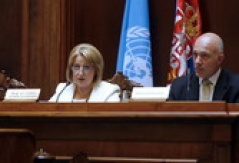National Assembly of the Republic of Serbia / Activities / Activity details

Tuesday, 25 May 2010
Press Conference on Corruption Perception and Occurrences in Serbia
The Speaker of the National Assembly of the Republic of Serbia, Prof. Dr Slavica Djukic-Dejanovic talked at the conference on the published results of the second round of research on corruption perception and occurrences in the Republic of Serbia carried out by Media Gallup agency.
The Speaker of the National Assembly of the
Djukic-Dejanovic appealed to everyone, particularly to state authorities, to join the systemic eradication of corruption, a huge social problem in
The Assembly Speaker said that, in view of the priorities of state policy and European Commission’s evaluation that
She stated that the Serbian Assembly had ratified a great number of international treaties, conventions and additional protocols which she believes to be important from the aspect of EU ascension, as well as the fight against corruption.
“By adopting the decision determining the National Anti-Corruption Strategy, the Assembly has obliged the state authorities to carry out the strategy’s recommendations. In order to implement said strategy the Parliament has passed a list of laws important for the struggle against corruption, and the current convocation has, among other things, passed the Law on the Anti-corruption Agency and elected the members of the Agency’s board”, said Djukic-Dejanovic.
Markovic said that the creation of anti-corruption mechanisms, primarily in state authorities is a long-term commitment that the agency cannot handle on its own and that it necessitates the support it enjoys from the parliament and which is both declarative and practical.
Infante said that the UN’s goal in
Medium
The research is part of the support project to the
-
12.15 - MPs and the members of the Culture and Information Committee meet with the MP of the Belarusian National Assembly Upper House and head of the Direction of the International Art Festival “Slavianski Bazaar” (National Assembly House, 13 Nikola Pasic Square, hall 3)
-
13.00 - press conference of MP Marinika Tepic (National Assembly House, 13 Nikola Pasic Square, Central Hall)
-
13.00 - sitting of the Committee on the Diaspora and Serbs in the Region (National Assembly House, 13 Nikola Pasic Square, hall 2)

